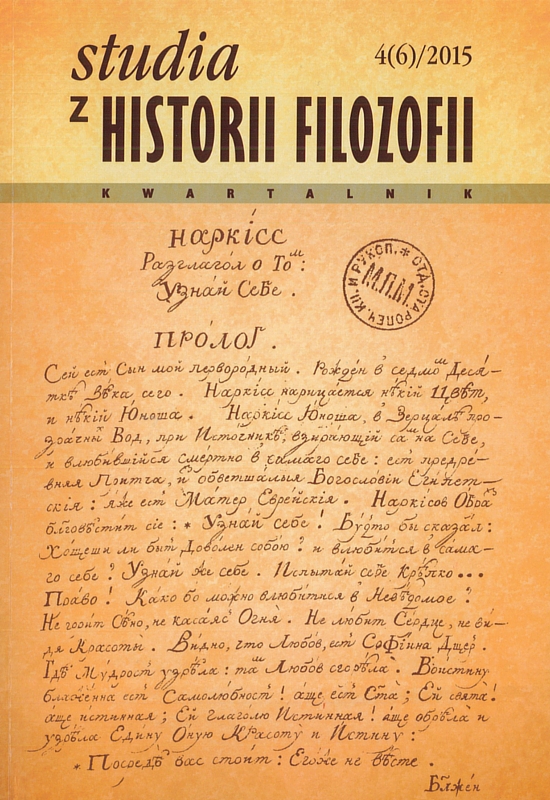Considerations Around the Platonic Conception of Laughter
DOI:
https://doi.org/10.12775/szhf.2015.056Keywords
Plato, Socrates, Home, , Democritus, irony, laughter, comedyAbstract
The purpose of this article is a critical reconstruction of the Platonic conception of laughter, which is presented primarily in Republic andPhilebus. A comic quality calls, in his opinion, to lower emotions, it throws human mind out of balance and undermines the prevailing order of values. The philosopher associates a laughter with the feeling of envy (phtonos), which comes down to the joy of humiliating of someone weaker. The comic envy - as opposed to passive jealousy - almost automatically leads to the activity, to the enhancement of humiliation. Laughter is caused according to Plato by a defect resulting from the ignorance about himself. The key feature of the comic situation is the asymmetry between the victim's weakness and the strength of a laughing person. Plato's concept of laughter turns out to be one-sided, when we compare it with "laughter of Democritus" which serves as a therapeutic and catharctic means. Laughter is here a clear signal that initiates the critical reflection on himself and gives impetus to a change of attitude towards the world. In his writings Plato did not include such educational and cognitive aspects of laughter because in his philosophy it becomes a specific antagonist of true knowledge. The negative attitude towards laughter does not go hand in hand with Plato’s recognition of Socrates, who used irony as a key element in his method of inquiry leading to truth.
References
Adorno T. W., Horkheimer M., Dialektyka oświecenia, tłum. M. Łukasiewicz, Warszawa 1994.
Arendt H., Kondycja ludzka, tłum. A. Łagodzka, Warszawa 2000.
Arystoteles, Polityka, [w:] tenże, Dzieła wszystkie, t. 6, tłum L. Piotrowicz, Warszawa 2001.
Baudelaire Ch., O istocie śmiechu oraz komizmie, tłum. J. Guze, [w:] B. Dziemidok, O komizmie. Od Arystotelesa do dzisiaj, Gdańsk 2011.
Bergson H., Śmiech, tłum. S. Cichowicz, Kraków 1977.
Blumenberg H., Der Sturz des Protophilosophen – Zur Komik der reinen Theorie anhand einer Rezeptionsgeschichte der Thales-Anekdote, [w:] Das Komische, (wyd. W. Presendanz, R. Warning), München 1976.
Filostrat Starszy, Obrazy, tłum. R. Popowski, Warszawa 2004.
Homer, Odyseja, tłum. L. Siemieński, Gdańsk 2000.
Johnson P., Historia Żydów, tłum. M. Godyń, M. Wójcik, A. Nelicki, Kraków 2000.
Kant I., Krytyka władzy sądzenia, tłum. J. Gałecki, Warszawa 1986.
Platon, Fileb, tłum. W. Witwicki, Kęty 2002.
Platon, Hippiasz mniejszy, [w:] tenże, Dialogi, t. 1, tłum. W. Witwicki, Kęty 1999.
Platon, Państwo, tłum. W. Witwicki, Kęty 2003.
Platon, Fedon, [w:] Platon, Dialogi, t. 1, tłum. W. Witwicki, Kęty 1999.
Platon, Gorgiasz, [w:] Platon, Dialogi, t. 1, tłum. W. Witwicki, Kęty 1999.
Platon, Protagoras, [w:] Platon, Dialogi, t. 1, tłum. W. Witwicki, Kęty 1999.
Platon, Teajtet, [w:] Platon, Dialogi, t. 2, tłum. W. Witwicki, Kęty 2005.
Plessner H., Śmiech i płacz, tłum. A. Zwolińska, Z. Nerczuk, Kęty 2004.
Prütting L., Homo ridens, t. 1, München 2013.
Pseudo-Hippokrates, O śmiechu Demokryta, tłum. K. Bartol, Gdańsk 2007.
Zucker D., Isaac: a life of bitter laughter, „Jewish Bible Quarterly”, Apr-Jun 2012, vol. 40.
Downloads
Published
How to Cite
Issue
Section
Stats
Number of views and downloads: 935
Number of citations: 0



